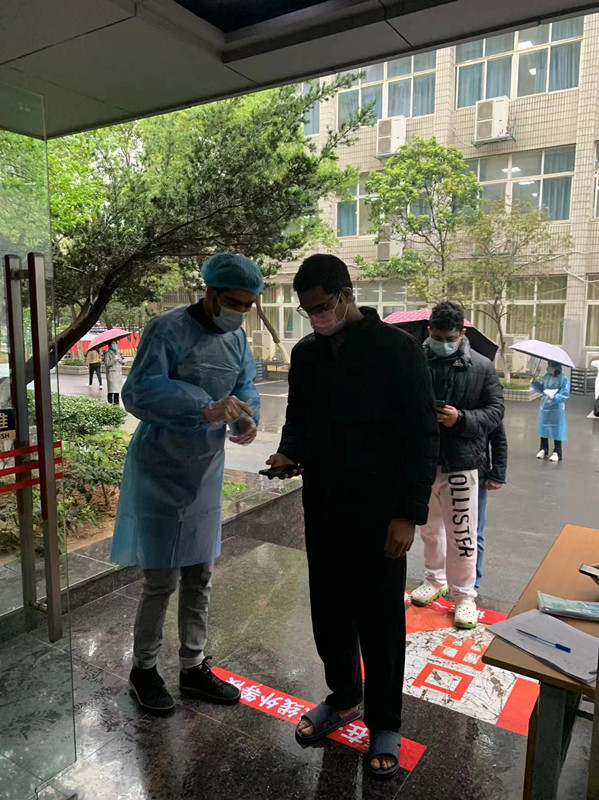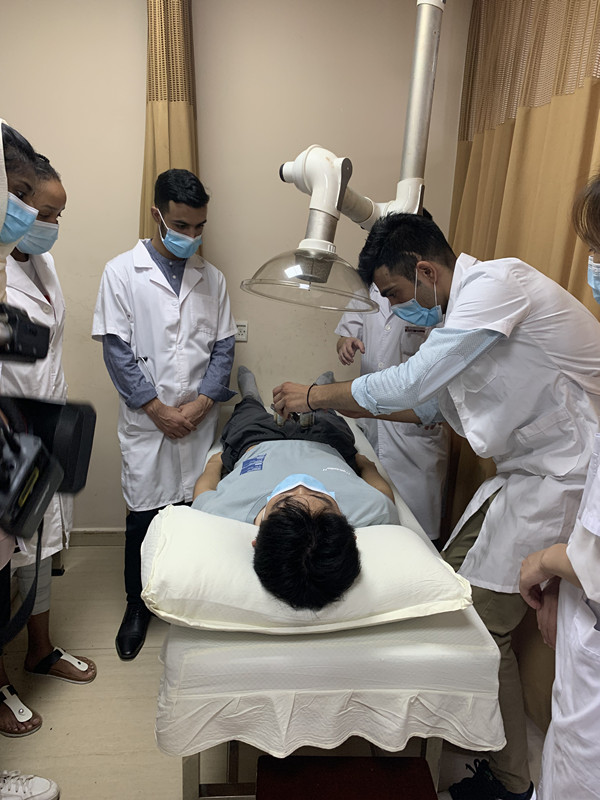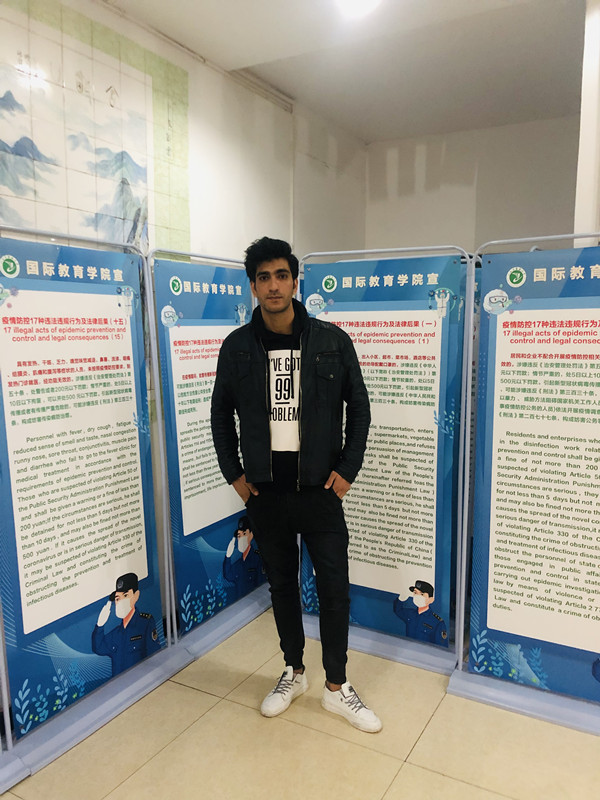
Fahad Kabeer, a Pakistani student from Jiangxi University of Chinese Medicine, working voluntarily in the fight against COVID-19 in March 2022 in Nanchang city, China. [Photo provided to China Economic Net]
NANCHANG, Mar. 25 (China Economic Net)- “I want to join in international firms to promote Traditional Chinese Medicines (TCM) in countries and regions involved in the Belt and Road Initiative,” said Fahad Kabeer, a Pakistani student from Jiangxi University of Chinese Medicine, Nanchang city, China.
Bounden duty to come forward as volunteer
Fahad a major in Chinese Medicine has been studying in China for almost six years. Now he can speak Chinese fluently. He has been volunteering in the recent nucleic acid testing in the campus of JXUCM since Nanchang fought against the recent COVID-19 outbreak in mid-March.
Fahad took charge of assisting international students with nucleic acid testing, reminding them of following the procedures and keeping order at the testing site. Though in a cold rainy day, he still worked for epidemic prevention.
“Although I am a foreign student, I am not an outsider. I am a member of the community. Now the city is in trouble. I think it is my bounden duty to come forward immediately,” said Fahad.
Fahad told China Economic Net (CEN) that “It is in Nanchang that I have gained a lot of knowledge of TCM and others and got meticulous care and attention from teachers and friends. Nanchang, a beautiful city, is my second hometown.”
“I am planning to purse my master degree in Nanchang, as JXUCM has experienced teaching faculty and advanced laboratories,” he added.
Ready to promote TCM globally
Fahad said, “It was a great suggestion by my neighbor to choose this major. In fact, I live in a region where people prefer herbal medicine to surgical treatments to cure diseases. So, such medical techniques made this major the best choice for me.”
Fahad said, “Before I came to China to study TCM, I thought it was a very simple subject, which was mainly to treat colds and fevers. Now, I found that TCM can be used in many fields and can treat many diseases.”
TCM can deal with some diseases in such an effective way that Western medicine cannot, he said. That’s why Fahad plans to promote TCM around the world.
Fahad told CEN that he would also like to bring the knowledge of TCM back to his hometown. “I am confident that my major will not only help my Pakistani compatriots in curing disease, but also play an important role in promoting the economic growth.”
He said, “Through exchange students, the Moxibustion and Acupuncture techniques of TCM could be introduced into Pakistan for the well-being and health of Pakistanis.”
“I would love to use the China-Pakistan Economic Corridor (CPEC) as a bridge between my major and the Pakistani people. I have witnessed the love and respect of the Chinese people towards Pakistanis. Therefore, I will play my role in strengthening the love between these two nations,” said Fahad.
Fahad advised that Pakistan and China should enhance the collaboration between the two nations’ institutes, including medical schools and hospitals.
Fahad also suggested that some vital TCM should be added into the framework of Pakistan-China Free Trade Agreement.
Fahad said, “CPEC is giving a lot of opportunities to everyone. I have plans to help my people improve their living standards. Being a Pakistani I believe in importance of CPEC and I am confident that this project is going to be successful.”
It is learnt that China and Pakistan have stepped up cooperation in TCM recently.
For example, Sino-Pakistan Cooperation Center on Traditional Chinese Medicine was launched respectively in University of Karachi in Pakistan and Hunan University of Medicine in Huaihua, Hunan province, China in 2021.
This center is dedicated to China-Pakistan traditional medicine cooperation. It carries out various cooperation between China and Pakistan, including R&D of drugs, health foods from herbal plants, academic and cultural exchanges, talents training, medical treatment, and industrial cooperation.
The China-Pakistan Joint Research Center for Nutrition and Health unveiled in Beijing China and Karachi Pakistan respectively on December 22, 2021.
The center is launched jointly by the Institute of Food Science and Technology (IFST) of the Chinese Academy of Agricultural Sciences (CAAS) and International Center for Chemical and Biological Sciences (ICCBS), University of Karachi, Pakistan.
At the launch ceremony, a representative of University of Karachi hoped to have more cooperation with China in the medicinal and food plant resources and education and training.
Jinhua Qinggan granules, a product of TCM, is the first one of its kind for the treatment of COVID-19 patients that has completed the clinical trial in Pakistan in January 2022.
In 2020, a Chinese pharmaceutical company once donated around 2,000 boxes of Yinhuang Qingfei Capsule, a TCM product to Pakistan to curb the pandemic.

Fahad Kabeer, a Pakistani student, treats a patient in Jiangxi University of Chinese Medicine, China. [Photo provided to China Economic Net]

Fahad Kabeer, a Pakistani student, treats a patient in Jiangxi University of Chinese Medicine, China. [Photo provided to China Economic Net]
稿件来源:中国经济网
网页链接:http://en.ce.cn/Insight/202203/25/t20220325_37436311.shtml


